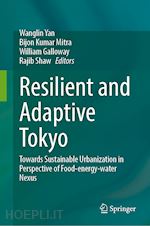
Questo prodotto usufruisce delle SPEDIZIONI GRATIS
selezionando l'opzione Corriere Veloce in fase di ordine.
Pagabile anche con Carta della cultura giovani e del merito, 18App Bonus Cultura e Carta del Docente
Our cities, and the systems that support them, have not been designed to address the FWE nexus. There exist gaps in awareness of the role and impacts of climate change. Improving communication among stakeholders with the support of scientific evidence is the key to narrowing the gaps. This book approached this issue with a multidisciplinary and transdisciplinary moveable nexus approach through the lens of FEW nexus under the project of the Sustainable Urbanization Global Initiative of Belmont Forum. It presents a collection of evidence/science-based planning decisions and participatory practices by using Tokyo as the focal area. It visualizes the stock and flow of the Food-Water-Energy (FEW) supporting the world’s largest metropolitan area, explores how the actors have worked together to secure the resilience and sustainability of resources, and demonstrates the potential of resources in making the city adaptive to climatic and social changes. It is designed for researchers in urbanization, nexus research, urban design research, environment, disaster risk reduction, and climate change studies, and can be used as a textbook for university courses. It is also a useful tool for practitioners and policymakers in applying collective knowledge to policy and decision-making.
Yan, Wanglin, Professor, Dr., Faculty of Environment and Information Studies, Keio University. Email: w_yan@keio.jp. Prof. Yan is a distinguished scholar in Environmental and Geo-informational Science for urban and regional planning by multi-disciplinary and transdisciplinary approaches. He is currently the president of Geographic Information System Association, Japan. He is also serving the sub-regional node of Asia-Pacific Adaptation Network of UNEP and is devoted to climate change adaptation and disaster risk reduction in Japan and northeast Asian countries. He has recently led the international consortium for the SUGI Nexus Program/M-NEX project and contributed to the co-creative design-led approach for urban food-energy-water management.
Galloway, Will, Assistant professor, Dr., Department of Architecture, Toronto Metropolitan University. Email: will.galloway@torontomu.ca. Will is an architect and urban planner, trained in Canada, the UK, and Japan. He taught at several universities in Japan, including Keio University and Waseda University, and currently teaches at Toronto Metropolitan University, Department of Architectural Science. In addition to research and teaching, he is the co-founder and director of the architecture office, frontoffice tokyo. His research focuses on resilience and adaptation, often making use of lessons learned from the examination of growth and change in cities.
Shaw, Rajib, Professor, Dr., Graduate School of Media and Governance, Keio University. Email: shaw@sfc.keio.ac.jp. Shaw is the Co-chair of the United Nations Asia-Pacific Science Technology Advisory Group (AP-STAG) and Coordinating Lead Author (CLA) IPCC’s 6th Assessment Report. He is the editor of a book series on disaster risk reduction, published by Springer, and the Chief Editor of an academic journal Progress in Disaster Science by Elsevier. He is the recipient of Pravasi Bhartiya Samman Award (PBSA) of 2021 in Education Sector from the President of India. He also received United Nations Sasakawa Award for disaster risk reduction as a lifetime achievement and for his contribution to global disaster resilience initiatives. More of his work can be seen in: www.rajibshaw.org.











Il sito utilizza cookie ed altri strumenti di tracciamento che raccolgono informazioni dal dispositivo dell’utente. Oltre ai cookie tecnici ed analitici aggregati, strettamente necessari per il funzionamento di questo sito web, previo consenso dell’utente possono essere installati cookie di profilazione e marketing e cookie dei social media. Cliccando su “Accetto tutti i cookie” saranno attivate tutte le categorie di cookie. Per accettare solo deterninate categorie di cookie, cliccare invece su “Impostazioni cookie”. Chiudendo il banner o continuando a navigare saranno installati solo cookie tecnici. Per maggiori dettagli, consultare la Cookie Policy.